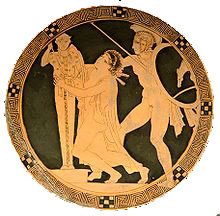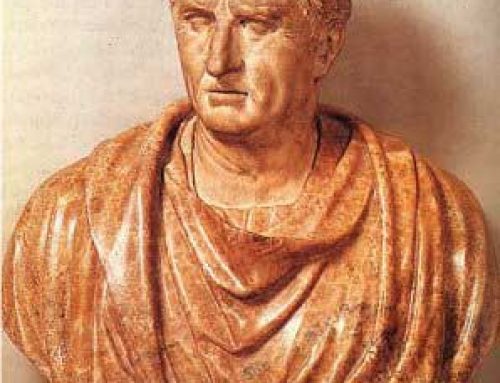
The Cassandra myth: Ajax the Lesser drags Cassandra away from the statue of Athena
Apollo curses Cassandra
Cassandra was a priestess of Apollo in Troy before the Trojan War. She was very beautiful, and Apollo saw her and fell in love with her. He offered her the gift of prophecy (being able to see what was going to happen in the future) if she would kiss him.
Who’s the god Apollo?
What’s the Trojan War?
More Greek myths
All our Ancient Greece articles
Cassandra agreed, and he gave her the gift, but when he went to kiss her she spit in his mouth. Apollo was very angry. He could not take away her gift, but he changed it so that she would always know what was going to happen, but nobody would ever believe her when she told them.

Clytemnestra kills Cassandra
Nobody believes Cassandra
Sure enough, Cassandra told all the people in Troy to watch out for the Trojan Horse, but nobody paid any attention. After the Trojans lost the war, the Greek warrior Ajax the Lesser (not the same one as the other Ajax) attacked Cassandra.
What’s the Trojan Horse?
The Greek goddess Athena
She was holding on to a statue of Athena for protection, but Ajax pulled her away from the sacred place and raped her.
Cassandra’s enslavement and death
Then Ajax gave Cassandra to Agamemnon as a slave. Agamemnon took Cassandra home to Mycenae, where she warned him that Clytemnestra was going to kill him, but again no one believed her. After killing Agamemnon, Clytemnestra killed Cassandra too. (Or in some versions, the murderer is Clytemnestra’s lover Aegisthus.)
Who was Agamemnon?
And who is Clytemnestra?
Slavery in ancient Greece
Hubris and the Cassandra myth
Like her owner Agamemnon, Cassandra’s showing hubris: she deliberately goes against what a god wants. That’s never a safe thing to do, in Greek mythology.
What is hubris?
Niobe and her kids
Arachne the weaver
Medusa in the temple
Tantalus serves dinner
For other ancient examples of hubris, check out the stories of Niobe and her children, or Arachne the weaver, or Medusa, or Tantalus.
Learn by doing: Greek play-reading
More about Agamemnon
Bibliography and further reading about Cassandra:
Cassandra : A Novel and Four Essays, by Christa Wolf (1988). A feminist re-telling of the story of Troy through the eyes of Cassandra. Critically acclaimed (for adults).
The Autobiography of Cassandra: Princess & Prophetess of Troy, by Ursula Molinaro. A similar re-telling (1979).
The Iliad of Homer (Oxford Myths and Legends), by Barbara Leonie Picard. A retelling of the story.
The Iliad (Penguin Classics) by Homer. Translated by Robert Fagles. A great translation!
The Trojan Women and Hippolytus (Dover Thrift Editions) by Euripides. Continues the story of Cassandra, in Euripides’ play about the fall of Troy (translated into English). Very cheap!
The Oresteia, by Aeschylus, translated by Robert Fagles (Penguin Classics). The end of the Cassandra story, and her murder, by the same translator as the Iliad above.





Inappropiate. Change the story please. No of that stuff Agax did
The story is a very old one; I didn’t make it up. Rape is an important part of understanding this story. If you’re young enough not to know what rape is, this story won’t bother you. If you know what it is already, then you can read the word here.